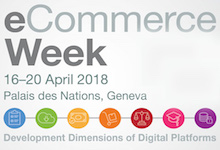Expanding e-commerce capacity for a sustainable 2030
17 Apr 2018 13:15h - 14:45h
Event report
[Read more session reports from the UNCTAD E-Commerce Week 2018]
This interactive session was organised by the International Chamber of Commerce (ICC) and brought together experts from business and government sectors to discuss information and communication technology (ICT) dissemination among micro, medium and small sized enterprises (MSMEs) in developing countries.
The moderator, Ms Elizabeth Thomas-Raynaud (Project Director, ICC Business Action to Support the Information Society (BASIS), and Senior Policy Executive, Digital Economy Commission started off by highlighting that MSMEs with online businesses are five times more likely to export than those with offline activities only. She noted that ICTs can be effectively deployed in the pursuit of all sustainable development goals (SDGs), but an enabling policy environment is needed.
Mr Francois Martins (Manager of Government Relations and Public Policy, Mercado Libre) briefly outlined how his company was created by two Stanford alumni in Buenos Aires in 1999 for the auctioning of mostly used goods. Today, 98% of the prices on their platforms are fixed and 95% of the products advertised are new. This was possible because entrepreneurs were able to connect to this platform and make a business out of it. Mercado Libre operates in 18 countries around Latin America and in Portugal. Martins outlined the challenge of digital connectivity, which remains unresolved, as well as that of addressing buyers and sellers with adequate solutions when disputes arise.
Ms Katrina Kosa-Ammari (Counsellor, Permanent Mission of Latvia to the United Nations and other International Organisations in Geneva) brought in language technologies and localisation services as underestimated contributors to enhancing e-commerce. Latvian is used by only 2 million people around the world, yet offering services in the local language increases the sales in a country, as people are more likely to make a transaction in their native language. Apart from purely financial gains, language and localisation services provide intangible value, contributing to language preservation and to culturally sensitive globalisation. As the language digital divide narrows, it can lead to building trust through inclusion. Kosa-Ammari warned that the accessibility of e-trade will remain limited and exclusive without a proper integration of local language(s) to ensure sustainable development.
Mr Vasco Crivelli Visconti (Executive Director, B2W) presented his Brazilian experience. B2W is a company operating only in Brazil, created in 2006 as a result of the merger of three large e-commerce players. Currently, it has around 30% of the domestic market share and it operates a hybrid business model, with both traditional retail and an online marketplace used by third parties. The latter is a vertically integrated platform that goes from a webstore down to distribution centres and logistics, including a network of trucks delivering 98% of their own orders. In Visconti’s view, a holistic approach to e-commerce is needed. The growing complexity of operations online can only be dealt with by deploying artificial intelligence (AI) and machine learning at scale. Moreover, policies need to go hand in hand with advanced techniques of treating data and information in a comprehensive manner.
Ms Sahra English (Vice-president, Global Public Policy, Mastercard) introduced a distinction between access to payment and access to finance. In their experience, access to finance for MSMEs in developing countries poses even more hurdles than payment operations. Mastercard currently works in emerging economies to develop low cost, low technology solutions such as barcodes to access and marketplace and accept payment. They also work with governments, NGOs and competitors to educate entrepreneurs on payments and financing. Among the regulatory burdens she pointed to, the most important ones are linked to financial regulations in certain countries. When it comes to fees, English clarified that her company does not benefit from them, but they represent the cost of accepting a payment that is guaranteed.
Presenting a different business model, Mr Tilmann Kupfer, (Vice-president, Trade and International Affairs, BT Group) stressed that they came a long way from the emblematic red phone-booths and are gaining 90% of their revenues from services that did not exist 20 years ago. He advocated for a holistic approach to e-commerce and for adopting a broad definition of it as both digital trade and the way in which trade is digitally enabled. This should comprise business-to-customer, but also business-to-business activities, which provide many opportunities for MSMEs to be better integrated in the global value chains. BT also operates its own global network, large cloud centres around the globe, and provides data services in a secure environment. However, Kupfer insisted, more work needs to be done for last-mile access.
The government representative on the panel, Mr Jorge Arbache (Secretary of International Affairs, Ministry of Planning, Brazil) made a reference to e-commerce as an important source of growth in his country, driving the policy-makers to create the right environment with the right conditions for it to deliver benefits to all. At the policy level, coherence and consistency are key not only domestically, but also internationally. By nature, e-commerce is cross-border and there is a need to have an integrated approach to policies in the field. It is important to look at both the digital and the non-digital part of the story. For every country there might be a different sequencing and timing of reforms to create the right synergies (regulatory framework, infrastructure etc.). Arbache concluded that we tend to overpromise the potential of e-commerce for economic development and we should be more cautious in this regard in order not to frustrate the MSMEs.
The discussion that ensued focused on the involvement of various stakeholders, the need for measurement in e-commerce in order to present data to governments and inform policy-makers, and thinking about the ecosystem with both big players and MSMEs, fostering a growth environment together.
By Roxana Radu
Related topics
Related event

